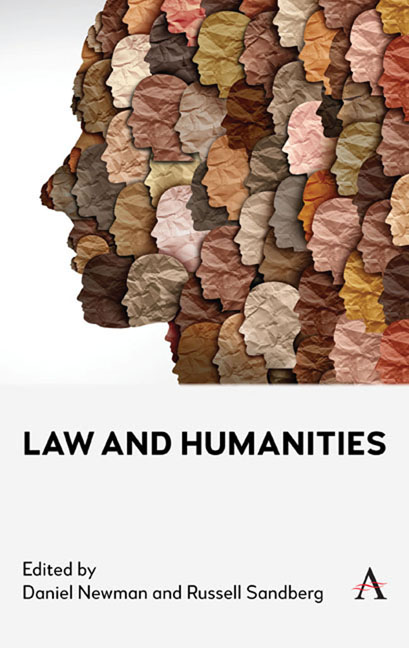Book contents
- Frontmatter
- Contents
- Preface
- List of Contributors
- Chapter One Introducing Law and Humanities
- Chapter Two Law and Archaeology
- Chapter Three Law and Comics/Graphic Justice
- Chapter Four Law and Film
- Chapter Five Law and Geography
- Chapter Six Law and History
- Chapter Seven Law and Literature
- Chapter Eight Law and Philosophy
- Chapter Nine Law and Popular Music
- Chapter Ten Law and Religion
- Chapter Eleven Law and Television
- Chapter Twelve Law and Theatre
- Chapter Thirteen Law and Theology
- Chapter Fourteen Law and Video Games
- Chapter Fifteen Conclusion: Subverting the Law and Humanities Canon
- Index
Chapter One - Introducing Law and Humanities
Published online by Cambridge University Press: 27 March 2024
- Frontmatter
- Contents
- Preface
- List of Contributors
- Chapter One Introducing Law and Humanities
- Chapter Two Law and Archaeology
- Chapter Three Law and Comics/Graphic Justice
- Chapter Four Law and Film
- Chapter Five Law and Geography
- Chapter Six Law and History
- Chapter Seven Law and Literature
- Chapter Eight Law and Philosophy
- Chapter Nine Law and Popular Music
- Chapter Ten Law and Religion
- Chapter Eleven Law and Television
- Chapter Twelve Law and Theatre
- Chapter Thirteen Law and Theology
- Chapter Fourteen Law and Video Games
- Chapter Fifteen Conclusion: Subverting the Law and Humanities Canon
- Index
Summary
Introduction
In 1901 in his Rede lecture the distinguished English legal historian Frederic William Maitland was pondering about how the common law had survived the Renaissance. Looking at the Year Books of Henry VII and Henry VIII, he remarked that these ‘ancient law reports are not a place in which we look for humanism or the spirit of the Renaissance: rather we look there for an amazingly continuous persistence and development of medieval doctrine’. Indeed, while Renaissance-era writers were generally contemptuous of anything medieval, Renaissance-era legal writers were not only continuing to use but were actually praising medieval texts. Maitland questioned:
How was it and why was it that in an age when old creeds of many kinds were crumbling and all knowledge was being transfigured, in an age which had revolted against its predecessor and was fully conscious of the revolt, [that] one body of doctrine […] remained so intact?
Maitland’s argument was that the common law survived because it was taught, studied and perpetuated by the Inns of Court and those they trained. As Maitland commented it was ‘difficult to conceive of any system better suited to harden and toughen a traditional body of law than one which, while books were still uncommon, compelled every lawyer to take part in legal education and every distinguished lawyer to read public lectures’. Legal education served to fossilise the law, bestowing a sacred aura upon what would otherwise seem archaic. As he put it:
Law schools make tough law.
Over a hundred years after Maitland’s lecture and many hundreds of years after the Renaissance, the common law continues to thrive. Attributing this persistence to the continuing role of legal education provokes a ‘chicken and the egg’ controversy as to causation. Yet, the role of Law Schools in making and perpetuating ‘tough law’ is so fundamental that it is taken for granted. Though there are exceptions, legal education remains characterised by doctrinal legal studies. The first stage of legal education focuses on the learning of legal principles, with a focus on their application. Law students are trained to operate as jurists.
- Type
- Chapter
- Information
- Law and Humanities , pp. 1 - 20Publisher: Anthem PressPrint publication year: 2024



